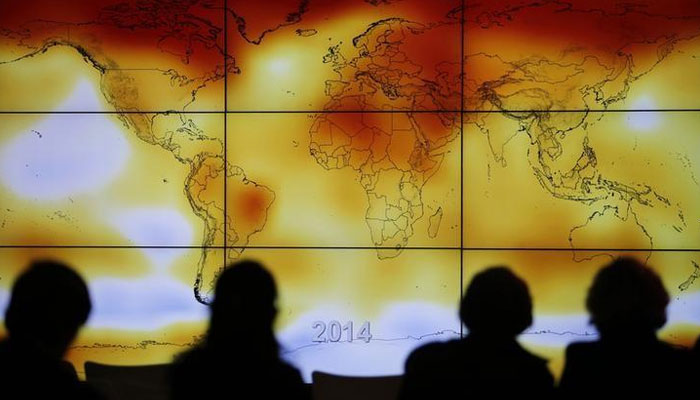Call for urgent steps to tackle effects of climate change in Pakistan
Climate emergency endangers millions of lives and failure to act promptly may lead to unimaginable consequences
July 20, 2020

Every year, meteorologists warn about the upcoming consequences of climate change, with some believing these alternations in the usual climatic conditions of the Earth’s surface would continue in the future due to the annual rise in global temperature.
Pakistan has been listed among the 10 most vulnerable countries to climate change that face catastrophic impacts. The country experiences myriad problems, such as extreme weather patterns, melting glaciers, rising sea level, deficiency of freshwater, floods, droughts, deforestation, and desertification, among others.
These challenges may be the cause of severe threats to life in Pakistan as the nation relies majorly on its agricultural economy. Expeditious desertification of fertile land will likely decrease crop yields and lead to the food insecurity. In addition, the coastline along the Arabian sea will probably be at a high risk of flooding.
Read more: Pakistan takes big stride forward in climate change, meets UN goal decade before deadline
Drought-like conditions in some agro-ecological areas of Pakistan — especially in Sindh and Balochistan — have started occurring already.
The Germanwatch Global Climate Risk Index's recent annual report has ranked Pakistan as the fifth most vulnerable country to climate change, citing the continuous and severe challenges it faces at present.
It is interesting — and alarming at the same time — how some recent happenings are evidence of the challenging and threatening circumstances caused by climate change in the country.
As the Pakistan Meteorological Department (PMD) announced the first spell of monsoon rainfall in Karachi, authorities became concerned that an expected 20% rise in the rainfall this year may cause urban flooding in the city.
Separately, a glacial lake outburst flood (GLOF) in Chitral's Golain Valley caused damage to the infrastructure and crops nearby, indicating how climate emergency has already started wreaking havoc.
Read more: 'Climate change driven' lightning strikes kill 147 people in India's Bihar state
While no loss of life was reported from the incident as residents had fortunately evacuated to safer places, the PMD announced the likelihood of more flash floods, possibly set off by another GLOF due to continuous hot weather. With a count of almost 7,000 glaciers, Pakistan has more glaciers than any other place on the Earth after the polar regions.
Climate emergency is not any one individual's issue; rather, it's a global challenge as many developed and technologically-advanced states have started facing calamities caused by climate change.
Just a few days ago, China saw flooding along Yangtze River as it recorded the heaviest rainfall in six decades. The incident left more than 141 people dead and many others were reported missing; on the other hand, numerous others were forced to evacuate and relocate.
In his comments on the matter, former UN secretary-general Ban Ki-moon said: "Climate Change does not respect border; it does not respect who you are rich or poor, small and big. Therefore, this is what we call ‘global challenges’ which require global solidarity.”
Read more: Pakistan's national parks aided by 'indigenous knowledge' but need laws
However, experts note that climate change has become one of the most controversial issues as there are two schools of thoughts. While one group believes that climate change is real, it is the other one — which sees it as a myth — that poses a significant risk to the world.
The latter includes US President Donald Trump, a key figure in global politics and someone who has labelled climate change to be a "political agenda" to hinder the economic development of his country.
Trump also withdrew from the 2016 Paris Agreement, which asks its 189 signatories to keep "a global temperature rise this century well below 2 degrees Celsius above pre-industrial levels and to pursue efforts to limit the temperature increase even further to 1.5 degrees Celsius".
Higher greenhouse emissions being one of the biggest causes of the climate emergency makes it easier to target and control the crisis. These solutions — based in research and scientific learning — include energy-efficient appliances with lower carbon emissions, renewable energy resources for power generation, avoiding deforestation and promoting afforestation, and creating awareness among the public about the urgency of the situation.
Read more: PM Imran inaugurates Monsoon Tree Plantation Campaign
A dire need for government intervention — on both federal and provincial levels — is of utmost importance in order to tackle the climate emergency before it is too late. Thus, leaderships of countries around the world must consider these possible solutions and introduce policies, as well as legislation, to curb the crisis.
Furthermore, the role of local administrations is pivotal in improving management systems to cope with any emergency and bolstering infrastructure to reduce the destruction from any natural disaster.
It is requisite to spread awareness about the possible catastrophic impacts of climate emergency and convince them that this man-made menace has to be controlled to ensure the survival of life on Earth as we know it.
Otherwise, millions of lives will be on stake and it may be too late to save our world!











